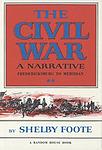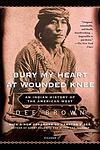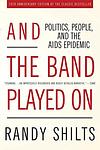The Greatest "History" Books Since 1950
Click to learn how this list is calculated.
This list represents a comprehensive and trusted collection of the greatest books. Developed through a specialized algorithm, it brings together 305 'best of' book lists to form a definitive guide to the world's most acclaimed books. For those interested in how these books are chosen, additional details can be found on the rankings page.
Genres
The category of "History" in books refers to the study and interpretation of past events, societies, and cultures. It encompasses a wide range of topics, including political, social, economic, and cultural developments, as well as the lives of individuals and groups who have shaped the course of history. History books can be written from various perspectives and may focus on specific time periods, regions, or themes. They aim to provide readers with a deeper understanding of the past and its impact on the present.
Countries
Date Range
Reading Statistics
Click the button below to see how many of these books you've read!
Download
If you're interested in downloading this list as a CSV file for use in a spreadsheet application, you can easily do so by clicking the button below. Please note that to ensure a manageable file size and faster download, the CSV will include details for only the first 500 books.
Download-
1. Silent Spring by Rachel Carson
This influential environmental science book presents a detailed and passionate argument against the overuse of pesticides in the mid-20th century. The author meticulously describes the harmful effects of these chemicals on the environment, particularly on birds, hence the metaphor of a 'silent spring' without bird song. The book played a significant role in advancing the global environmental movement and led to a nationwide ban on DDT and other pesticides in the United States.
The 61st Greatest Book of All Time -
2. Memoirs of Hadrian by Marguerite Yourcenar
"Memoirs of Hadrian" is a historical novel that presents a fictional autobiography of the Roman Emperor Hadrian, who reigned from 117 to 138 AD. Narrated in the first person, the novel explores Hadrian's ascension to the throne, his administration, his love for the young Antinous, and his philosophical reflections on life and death. The narrative is framed as a letter to his successor, Marcus Aurelius, offering insights into the complexities of power, the nature of leadership, and the human condition.
The 310th Greatest Book of All Time -
3. The Civil War by Shelby Foote
This comprehensive three-volume series provides an in-depth and detailed narrative of the American Civil War. It encompasses the political, social, and military aspects of the war, offering a balanced view of both the Union and Confederate sides. The series also delves into the personal experiences of key figures, including generals and soldiers, as well as civilians affected by the war. This work is known for its meticulous research, vivid descriptions, and engaging storytelling style.
The 398th Greatest Book of All Time -
4. Life and Fate by Vasily Grossman
"Life and Fate" is a sweeping epic that explores the human condition during the Siege of Stalingrad in World War II. The novel delves into the lives of a wide range of characters, from soldiers and scientists to children and victims of the Holocaust, providing a stark and unflinching portrayal of the horrors of war, the brutality of totalitarianism, and the resilience of the human spirit. At the same time, it also examines themes of love, loss, and the struggle for freedom and dignity in the face of overwhelming adversity.
The 438th Greatest Book of All Time -
5. Dispatches by Michael Herr
This book is a first-hand account of the Vietnam War from a war correspondent's perspective. The author vividly describes the chaos, violence, and absurdity of the war, providing a raw and unfiltered look at the experiences of soldiers on the ground. The narrative is filled with gritty details and intense imagery, capturing the fear, boredom, and disillusionment that characterized the war. The book is considered a classic of war reportage, lauded for its honest and brutal portrayal of the realities of combat.
The 516th Greatest Book of All Time -
6. Roots by Alex Haley
This groundbreaking historical novel follows several generations of an African American family, beginning with Kunta Kinte, a man captured in Gambia in the 18th century and sold into slavery in the United States. Through Kinte and his descendants, the narrative explores the brutal realities of slavery and its aftermath, the struggle for freedom and civil rights, and the perseverance of a family through immense hardship. The story is based on the author's own family history, making it a significant work in the exploration of African American heritage and identity.
The 533rd Greatest Book of All Time -
7. The Making of the English Working Class by E. P. Thompson
This book is a comprehensive historical analysis of the formation of the English working class from the late 18th century to the mid-19th century. The author meticulously examines various aspects of society including the Industrial Revolution, the rise of Methodism, and political movements, arguing that the working class was not a byproduct of economic factors alone, but was actively self-formed through struggles over issues like workers' rights and political representation. The book is widely regarded as a seminal text in social history due to its focus on the experiences and agency of ordinary people.
The 547th Greatest Book of All Time -
8. The Origins of Totalitarianism by Hannah Arendt
The book explores the roots of totalitarian systems, particularly focusing on Nazi Germany and Stalinist Russia. It delves into the historical, social, and political circumstances that led to the rise of these oppressive regimes, including anti-Semitism, imperialism, and the decline of the nation-state. The author further discusses the nature of power, the role of propaganda, and the manipulation of the masses in these systems, providing a comprehensive analysis of totalitarianism.
The 577th Greatest Book of All Time -
9. Bury My Heart at Wounded Knee by Dee Alexander Brown
This book is a compelling historical narrative that chronicles the systematic decimation of Native American tribes in the United States during the late 19th century. The author uses council records, autobiographies, and firsthand descriptions to provide a detailed account of the battles, massacres, and broken treaties that led to the destruction of the Native American way of life. The book centers on significant events such as the Battle of Little Bighorn and the Wounded Knee Massacre, offering a voice to the often overlooked Native American perspective.
The 603rd Greatest Book of All Time -
10. Night by Elie Wiesel
This book is a memoir of the author's experiences during the Holocaust, specifically in the Auschwitz and Buchenwald concentration camps. The narrative focuses on the relationship between a father and son under the most extreme circumstances, the loss of faith in God, humanity, and in each other, and the horrifying reality of the systematic genocide of six million Jews during World War II. The book is a poignant and stark examination of the depths of human evil and the enduring power of hope and survival.
The 634th Greatest Book of All Time -
11. Fateless by Imre Kertész
"Fateless" is a harrowing account of a Hungarian Jewish boy's experiences in Nazi concentration camps during World War II. The protagonist is sent to Auschwitz, then Buchenwald, and finally to a factory in Zeitz, enduring brutal conditions and witnessing unimaginable horrors. Despite his experiences, he maintains a detached, almost indifferent perspective, focusing on the mundane aspects of life in the camps, which further highlights the absurdity and horror of the situation. The novel explores themes of identity, survival, and the arbitrary nature of fate.
The 685th Greatest Book of All Time -
12. Ways Of Seeing by John Berger
This book is a seminal work of art criticism that challenges traditional Western cultural aesthetics by examining the ways in which we culturally learn to view art, particularly the impact of modern mass-reproduction on our experience of seeing. The author argues that the context, or "gaze," through which we perceive art significantly affects its meaning and our appreciation of it. The book also explores the portrayal of women in art and society, the relationship between art and ownership, and the connection between historical context and visual perception. It is a provocative critique that encourages readers to reconsider the role of visual imagery in our everyday lives and the power structures inherent in the act of looking.
The 799th Greatest Book of All Time -
13. Tristes Tropiques by Claude Lévi-Strauss
"Tristes Tropiques" is a blend of autobiography, travel literature, and anthropology by a renowned scholar. The book is a recounting of the author's travels and anthropological work, primarily in Brazil, in the 1930s. It provides a critical and philosophical reflection on his experiences and observations, offering insights into indigenous tribes like the Nambikwara and Tupi-Kawahib, and exploring themes of cultural change, the nature of anthropology, and the author's own disillusionment with Western civilization.
The 824th Greatest Book of All Time -
14. The Making of the Atomic Bomb by Richard Rhodes
This comprehensive book provides an in-depth account of the development of the atomic bomb during World War II. It explores the scientific advancements that made the bomb possible, the political decisions that led to its creation, and the moral dilemmas faced by the scientists involved. The book also details the personalities of key figures in the Manhattan Project, the effects of the bomb on Hiroshima and Nagasaki, and the impact of nuclear weapons on the world.
The 840th Greatest Book of All Time -
15. The Guns of August by Barbara Tuchman
"The Guns of August" is a detailed and engaging account of the first month of World War I. The book explores the events leading up to the war, the political and military strategies of the various countries involved, and the critical decisions that shaped the course of the conflict. It presents a vivid picture of the war's early stages, highlighting the miscalculations, miscommunications, and misunderstandings that led to one of the most devastating wars in history.
The 918th Greatest Book of All Time -
16. Eichmann in Jerusalem: A Report on the Banality of Evil by Hannah Arendt
This book is a thought-provoking exploration of the trial of Adolf Eichmann, a major organizer of the Holocaust. The author argues that Eichmann was not a fanatical ideologue, but rather an ordinary individual who simply followed orders and bureaucratic procedures, highlighting the terrifying potential for evil in any system that values obedience over personal responsibility. The concept of the "banality of evil" is introduced, suggesting that horrific acts can be committed by ordinary people under certain conditions.
The 977th Greatest Book of All Time -
17. Kolyma Stories by Varlam Shalamov
"Kolyma Stories" is a collection of short stories that vividly depict the harrowing experiences of prisoners in the Soviet Gulag during the Stalinist era. Written by Varlam Shalamov, a survivor of the Kolyma labor camps himself, the book offers a raw and unflinching portrayal of the inhumane conditions, extreme suffering, and moral degradation endured by the prisoners. Through his powerful and haunting narratives, Shalamov sheds light on the resilience of the human spirit and the indomitable will to survive amidst unimaginable cruelty.
The 1005th Greatest Book of All Time -
18. Wild Swans: Three Daughters of China by Jung Chang
This book is a biographical account of three generations of women in China, spanning the years 1909 to 1991. The narrative follows the lives of the author's grandmother, a warlord's concubine; her mother, a high-ranking official in the Communist Party; and the author herself, who grew up during the Cultural Revolution before moving to the West. The book presents a vivid portrayal of the political and social changes in China during the 20th century, as seen through the eyes of these three women.
The 1023rd Greatest Book of All Time -
19. Discipline and Punish by Michel Foucault
This book delves into the historical evolution of the penal system, examining how Western societies have transitioned from a regime of violent, public physical punishment to a more subtle form of surveillance and control. It introduces the concept of the "panopticon," a metaphor for modern disciplinary societies that exercise power through observation and normalization rather than through overt physical coercion. The work explores the relationship between power, knowledge, and social control, arguing that disciplinary mechanisms are embedded in various institutions, such as schools, hospitals, and prisons, shaping individuals and maintaining order in society.
The 1064th Greatest Book of All Time -
20. The Great War and Modern Memory by Paul Fussell
"The Great War and Modern Memory" is a critical analysis of the impact of World War I on the English society and culture. The author explores the war's influence on literature, language, and symbolism, arguing that the horrific experiences of the war drastically altered public perception and understanding of conflict, honor, and heroism. The book combines literary criticism, history, and social commentary to provide a comprehensive examination of the war's lasting effects on the collective memory of the English-speaking world.
The 1118th Greatest Book of All Time -
21. A Time Of Gifts by Patrick Leigh Fermor
The book is a vivid memoir that chronicles the adventures of a young man as he embarks on a remarkable journey on foot across Europe in the 1930s. Starting from the Hook of Holland, he traverses through landscapes and cities, encountering a diverse tapestry of cultures, languages, and historical remnants. Along the way, he is welcomed by a variety of individuals, from aristocrats to peasants, who enrich his experience with their stories and hospitality. His travels provide not only a physical journey through the continent but also a journey through time, as he reflects on the complexities of Europe's past and the ominous shadows cast by the approaching Second World War.
The 1119th Greatest Book of All Time -
22. And the Band Played On by Randy Shilts
This book is a comprehensive chronicle of the emergence of the AIDS epidemic in the United States in the 1980s. It explores how the disease was initially ignored by many health professionals and politicians, leading to its spread and the deaths of thousands of people. The book also examines the impact of the disease on the gay community and the role of various institutions, including the medical community, the media, and the government, in responding to the crisis. It's a powerful critique of the indifference and negligence that allowed the disease to become a global pandemic.
The 1120th Greatest Book of All Time -
23. Battle Cry of Freedom by James M. McPherson
"Battle Cry of Freedom" is a comprehensive exploration of the events leading up to, during, and following the American Civil War. The book delves into the political, social, and economic factors that led to the war, and examines the strategies, battles, and key figures of this pivotal period in American history. It also provides an in-depth analysis of the consequences of the war and its impact on the United States.
The 1139th Greatest Book of All Time -
24. Guns, Germs, and Steel by Jared Diamond
The book is a comprehensive exploration of the different trajectories of human societies throughout history. It argues that environmental factors, rather than racial or cultural differences, are the primary reason why some societies developed more advanced technology and political systems. The author uses a multidisciplinary approach, drawing from fields such as geography, evolutionary biology, and linguistics, to support his thesis. The book covers a wide range of topics, including the domestication of plants and animals, the invention of writing, and the spread of diseases.
The 1140th Greatest Book of All Time -
25. Andersonville by MacKinlay Kantor
"Andersonville" is a historical novel set during the American Civil War, focusing on the Confederate prisoner-of-war camp, Andersonville prison. The narrative vividly portrays the horrific conditions and experiences of the Union soldiers held captive there. It delves into the lives of the prisoners, their captors, and the surrounding civilian population, providing a comprehensive and brutal depiction of one of the most notorious chapters in American history.
The 1147th Greatest Book of All Time
Reading Statistics
Click the button below to see how many of these books you've read!
Download
If you're interested in downloading this list as a CSV file for use in a spreadsheet application, you can easily do so by clicking the button below. Please note that to ensure a manageable file size and faster download, the CSV will include details for only the first 500 books.
Download























